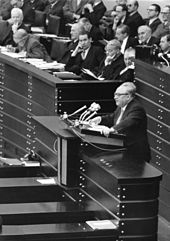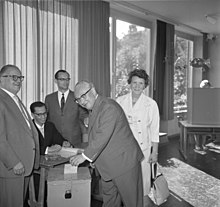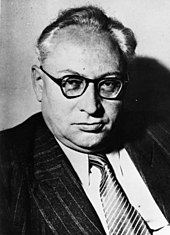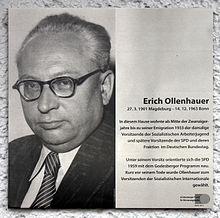Erich Ollenhauer
Erich Ollenhauer (born March 27, 1901 in Magdeburg , † December 14, 1963 in Bonn ) was SPD party leader and parliamentary group leader in the German Bundestag from 1952 to 1963 .
Family and education
Ollenhauer was the oldest of four children, his father Wilhelm was a bricklayer and became a member of the SPD in 1901. His sister Hilde (1902–1995) was also politically active from an early age and into old age. After graduating from elementary school in 1915, Erich Ollenhauer wanted to become a teacher, but for financial reasons he had to complete a commercial apprenticeship in a printing company. Two short-term jobs followed. Eventually he became a volunteer at the social democratic daily Volksstimme in Magdeburg.
Weimar Republic
In 1918 Ollenhauer joined the SPD. From December 1, 1920 he was second secretary to the main board of the Association of Workers' Youth Associations of Germany (VAJV), the youth organization of the SPD, and became editor of their bi-weekly magazine Arbeiterjugend . In 1921 he was also secretary of the International of the Working Youth .
The merger of the SPD with most of the remaining USPD resulted in the union of its youth organizations, the VAJV with the Socialist Proletarian Youth (SPJ) of the USPD, on October 29, 1922 to form the Socialist Workers' Youth (SAJ). Ollenhauer became secretary of the SAJ under the chairman Max Westphal . In 1928 Ollenhauer was able to take over the chairmanship and lead the SAJ as a youth organization loyal to the SPD.
During the Weimar Republic he was a member of the Reichsbanner Schwarz-Rot-Gold organization for the protection of the republic .
time of the nationalsocialism
On April 26, 1933, shortly after the takeover of the Nazi regime to Adolf Hitler , Ollenhauer was elected to the party executive. After the fire in the Reichstag and the Reichstag elections on March 5, 1933 , the systematic suppression of political resistance began: on May 2 , trade union houses were occupied and the party executive decided that some particularly endangered members of the executive board must immediately evade the possible access of the Nazi regime. Ollenhauer was one of them. You were commissioned to set up a party executive in exile abroad.
On May 6, Ollenhauer, like many other party officials, emigrated to Prague with the then party chairmen Otto Wels and Hans Vogel . There they formed the SoPaDe with Paul Hertz , Friedrich Stampfer and others . In 1935 his German citizenship was revoked and he was given a Czechoslovak auxiliary passport. About a year before the Wehrmacht invaded Czechoslovakia , the SoPaDe moved to Paris . Ollenhauer left Prague with his family and moved to France via Poland and Denmark.
When the German invasion of north-eastern France (see Western campaign ) was imminent, he was imprisoned as a German in a Paris stadium and only released again due to the influence of Léon Blum . After his release, Ollenhauer stayed in the unoccupied part of France until he and his family fled to Lisbon via Spain in September 1940 - now equipped with US aid passports because Czechoslovakia no longer existed - together with Hans Vogel and his family . A year later the Ollenhauers came to London , where the SoPaDe had established itself for the last years of the war; Erich Ollenhauer became the closest employee of SoPaDe chairman Hans Vogel. With the support of the British Labor Party , Ollenhauer was able to stop the disintegration of the organizational structures of the emigrants, to prepare the reconstruction of the SPD and to maintain contact with British politicians. In 1945 Ollenhauer was the only representative of the SoPaDe to receive approval from the British to participate in the SPD conference in Hanover .
post war period

Ollenhauer returned to Germany in February 1946. He became secretary in the SPD founding office of Kurt Schumacher in Hanover. At the first SPD party congress after the end of the war in the same year, he was elected Schumacher's deputy. As the organizer of the party headquarters, Ollenhauer ran the party in Schumacher's frequent and sometimes several months' absence due to illness. Since Schumacher had to divide his forces (and also because Ollenhauer brought international experience and contacts with him), he took over all international contacts - both with other social democratic parties in Europe as well as with foreign governments, especially the victorious powers.
In the first federal election on August 14, 1949, Ollenhauer was elected directly to the German Bundestag in the Bochum constituency and was elected deputy chairman by the SPD parliamentary group .
In 1951 he became a member of the "Joint Assembly of the European Coal and Steel Community " (ECSC). He ended this collaboration after Schumacher's early death on August 20, 1952 or before the 1953 federal election . Ollenhauer - he was considered the “perfect number 2” at the time - took over the offices of Schumacher on September 27, 1952 as party chairman, parliamentary group chairman and opposition leader .

In the Bundestag election in September 1953, Ollenhauer ran for the first time as SPD candidate for chancellor . The party stagnated with 28.8 percent of the vote (a minus of 0.4 percentage points ) and could not prevail against Chancellor Adenauer , under whose leadership the CDU / CSU improved from 31.0% to 45.2% of the votes.
Although the SPD in many important laws of the CDU-led government of Adenauer , as war victims , pension reform and Montan was co-determination involved, was perceived by Schumacher's foreign policy in the public mainly Ollenhauer Continuation: No to integration with the West , yes to the reunification of Germany. Above all, the economic policy of the federal government of Ludwig Erhard , the so-called economic miracle , moved into public interest. Ollenhauer found it difficult to push the SPD's change from a workers' party to a people 's party .
In March 1957 the “Ollenhauer Plan” appeared, which, according to the historian Joseph Rovan, “reunited the problems of security, rearmament and reunification in a totally unrealistic context”. The Cold War had lost its intensity four years after Stalin's death (see also the thaw period ), but relaxation between the great powers only appeared possible on the basis of the status quo . "The far too detailed and difficult to understand text of the Ollenhauer Plan, which was soon to fall into deserved oblivion, was not meant to shake up the masses."
In the federal election in September 1957 , the SPD was able to improve by 3.0 percentage points to 31.8 percent of the vote under Ollenhauer, who was running for the second time as candidate for chancellor, but this gain was overshadowed by the result of the Union parties , the 5.0 percentage points and achieved an absolute majority with 50.2 percent of the votes .
After that, Ollenhauer waived a third candidacy. As a result of the election defeat, processes of rethinking began in the SPD, which Ollenhauer took over as moderator. The programmatic and organizational reorientation of the SPD finally resulted in the Godesberg program (November 1959).

The program, promoted by the reformers around Willy Brandt , Fritz Erler and Herbert Wehner and supported by Ollenhauer, in part very clearly broke with the traditional party line: In addition to Adenauer's foreign policy ( integration with the West ), rearmament was also advocated and central administration was rejected. In particular, the SPD renounced Marxism. Ollenhauer played an important role in this substantive reorientation because, as party chairman and representative of the older generation of the party, he guaranteed that this restructuring would take place in a measured manner and without excluding individual party groups. Ollenhauer also began to involve artists in the campaign preparation team. In this context (through the mediation of Bruno Friedrich ) the writer Gerhard Zwerenz and the painter and sculptor Hans Lewerenz participated in the preparation of the 1961 federal election .
In November 1960, at the suggestion of Carlo Schmid and with the support of Ollenhauer , the party executive nominated Berlin's governing mayor Willy Brandt as the new candidate for chancellor.
Three months before his death, Ollenhauer was elected chairman of the Socialist International on September 9, 1963 . On December 14th of the same year he died of a pulmonary embolism in Bonn .
Willy Brandt became his successor as party chairman. Fritz Erler assumed the chairmanship of the parliamentary group .
Five days after his death (on December 19, 1963) the Federal Republic of Germany honored him with a state ceremony in the plenary hall of the Bundestag. He was buried in the south cemetery in Bonn not far from the Erich-Ollenhauer-Haus on today's Erich-Ollenhauer-Straße.
As early as March 1964, Ollenhauerstrasse was named after him in Berlin. It ends appropriately at Kurt-Schumacher-Platz , which is also the main thoroughfare of Kurt-Schumacher-Damm. In Bocklemünd / Mengenich , the Schumacher and Ollenhauerring are two central access roads.
literature
- Willy Albrecht: Ollenhauer, Erich. In: New German Biography (NDB). Volume 19, Duncker & Humblot, Berlin 1999, ISBN 3-428-00200-8 , p. 524 f. ( Digitized version ).
- Dieter Dowe (ed.): Erich Ollenhauer (1901–1963), a life for German social democracy. Speeches for the 100th birthday on March 27, 2001. (= History discussion group. 42). Friedrich-Ebert-Stiftung , Historical Research Center, Bonn 2001, ISBN 3-86077-950-8 .
- Brigitte Seebacher-Brandt : Ollenhauer. Honest man and patriot. With a foreword by Ernst Nolte . Siedler, Berlin 1984, ISBN 3-88680-144-6 (also dissertation, FU Berlin 1984).
- Erich Ollenhauer , Internationales Biographisches Archiv 04/1964 of January 13, 1964, in the Munzinger Archive ( beginning of article freely available)
- Hans-Jochen Vogel , Klaus Erich Pollmann : Erich Ollenhauer and the German social democracy. Speeches on the occasion of the 90th anniversary of his birthday in Magdeburg . Edited by Dieter Dowe. Department of Social and Contemporary History of the Friedrich-Ebert-Stiftung , Bonn 1991, ISBN 3-926132-67-1 .
Web links
- Literature by and about Erich Ollenhauer in the catalog of the German National Library
- Dorlis Blume, Irmgard Zündorf: Erich Ollenhauer. Tabular curriculum vitae in the LeMO ( DHM and HdG )
- Erich-Ollenhauer-Haus , children's and youth leisure center in Ludwigshafen am Rhein
- Newspaper article about Erich Ollenhauer in the 20th century press kit of the ZBW - Leibniz Information Center for Economics .
Individual evidence
- ↑ Joseph Rovan: History of the German Social Democracy. Fischer, Frankfurt 1980 (Paris 1978), p. 222.
- ↑ Ollenhauerstrasse. In: Street name lexicon of the Luisenstädtischer Bildungsverein (near Kaupert )
| personal data | |
|---|---|
| SURNAME | Ollenhauer, Erich |
| BRIEF DESCRIPTION | German politician (SPD), Member of the Bundestag, MEP |
| DATE OF BIRTH | March 27, 1901 |
| PLACE OF BIRTH | Magdeburg |
| DATE OF DEATH | December 14, 1963 |
| Place of death | Bonn |


